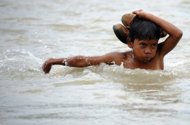UN aid appeal for Philippine floods falls short

The official death toll from tropical storm Washi -- which destroyed entire villages built on sandbars and on riverbanks in two port cities on December 16 -- is 1,259, but many more are believed to have been buried or washed out to sea.
Meanwhile, another 222,000 survivors are struggling after losing their homes and need help, according to the United Nations Humanitarian Coordinator for the Philippines, Jacqui Badcock.
She said a "flash appeal" for $28 million issued immediately after the disaster had attracted only $7.4 million.
"It (the shortfall) doesn't stop us from being active, but there are many projects we could expand if we got more resources," Badcock told AFP.
"We could build more latrines, put up more temporary shelters."
Badcock said that 26,000 of the survivors were in overcrowded evacuation centres in the cities of Cagayan de Oro and Iligan, while another 200,000 were living in makeshift shelters or with relatives.
Many of the evacuation centres are gymnasiums and schoolhouses, but this has caused problems since students returned to classes after the Christmas holidays, according to Badcock.
"Right now, they are trying to strike balances in the evacuation centres where children are given lessons while families wait outside," she said.
Another growing concern is the psychological counselling needed by survivors of the floods, she added.
Victoriano Kapayo, 30, buried two drowned children after the flood, and he said he was haunted by thoughts of a third child, a six-year-old daughter, who remains missing.
"I feel she is still alive. I always see her in my dreams," he said at the gymnasium where he and his wife were being sheltered.
What the stars mean:
★ Poor ★ ★ Promising ★★★ Good ★★★★ Very good ★★★★★ Exceptional
Latest News
More News
- Russian President congratulates Vietnamese Party leader during phone talks (January 25, 2026 | 09:58)
- Worldwide congratulations underscore confidence in Vietnam’s 14th Party Congress (January 23, 2026 | 09:02)
- Political parties, organisations, int’l friends send congratulations to 14th National Party Congress (January 22, 2026 | 09:33)
- 14th National Party Congress: Japanese media highlight Vietnam’s growth targets (January 21, 2026 | 09:46)
- 14th National Party Congress: Driving force for Vietnam to continue renewal, innovation, breakthroughs (January 21, 2026 | 09:42)
- Vietnam remains spiritual support for progressive forces: Colombian party leader (January 21, 2026 | 08:00)
- Int'l media provides large coverage of 14th National Party Congress's first working day (January 20, 2026 | 09:09)
- Vietnamese firms win top honours at ASEAN Digital Awards (January 16, 2026 | 16:45)
- ASEAN Digital Ministers' Meeting opens in Hanoi (January 15, 2026 | 15:33)
- ASEAN economies move up the global chip value chain (December 09, 2025 | 13:32)
















 Mobile Version
Mobile Version